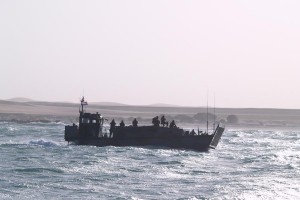WASHINGTON, Oct. 29, 2010 — “The wars of the future will be fought in the cyber domain” sounds like a bad movie tagline from 20 years ago, but it’s becoming truer by the day, and the Air Force is readying troops for that battle.
During an Oct. 27 “DOD Live” bloggers roundtable, Air Force Brig. Gen. Walter D. Givhan, commandant of the Air Force Institute of Technology at Wright-Patterson Air Force Base, Ohio, discussed the importance of cybersecurity and the newest class of students graduating from the AFIT Center for Cyberspace Research.
AFIT itself has been in existence since 1919, researching and expanding the technology available to the U.S. military, beginning with flight.
“Even at that time, there was a new technology — flight, the ability to fly,” Givhan said. “Part of what had to be core to us in dealing with this new technology was education — education and research — and that we couldn’t just depend upon others, but it had to be part of what we were doing, directly connected to us.”
Now, Givhan said, AFIT has added graduate-level cybersecurity education and research to its academic offerings. Some training and research has been going on already, since the advent of computer networking on a large scale, but now AFIT offers master’s degrees and doctorates in cyber fields.
“What we are doing is truly continuing education — it’s not training,” he said. “We’re educating [students] on the capabilities, with a little bit of hands-on work as well on particular technology and capabilities within that technology. But it’s not like we’re giving them a specific cyberweapon and teaching them how to fire or use that specific cyberweapon.”
The two main courses, Cyber 200 and Cyber 300, give students two slightly different looks at cyber operations, but cover the same main topics: the technology, the policy, the doctrine and the law as they relate to the cyber domain.
Cyber 200 is intended for field grade officers and some noncommissioned officers with six to eight years of service and some experience in the cyber domain. In the three-week course, Givhan said, students focus on tactical and operational issues relevant to what they may face in their line of work.
The more advanced two-week 300 course, designed for higher-ranking officers with 12 or more years of total service with at least six of those years working with cyber issues, focuses on broader concepts, the general said.
“These are the folks who are actually going to be helping make this happen in terms of what the joint force commander needs and how to integrate our cyber capabilities into his plan and to accomplish his objectives,” Givhan said.
The first class of Cyber 200 and Cyber 300 students graduated yesterday.
The venture is exciting, Givhan said, because it involves new technology. They’re testing limits, he added, rather than working within “safe” parameters. Thanks to the growth of computer networking jobs in the private sector, he noted, the Air Force Reserve and Air National Guard can be involved closely as well.
“They’re actually involved in this on the outside, in civilian jobs having to do with cyber,” he said.
The field’s growth in the private sector also helps to bring in recruits who have worked for civilian companies in network administration or security. AFIT has begun some programs for ROTC cadets, Givhan said, adding that he hopes those will expand as people learn more about the importance of cybersecurity and as the Air Force can teach more about it.
“This is a conversation. … This is not a one-way sort of delivering lectures and things, and people are just soaking it up,” the general said. “This is all so new and exciting and rapidly changing.
“We depend upon the participation of everyone who’s part of the class and the instructors,” he continued, “and we all learn from each other in this. And it’s changing so fast that the iterative process that we use to reinforce what we’re doing … is going to change every time we give it.”
Source:
U.S. Department of Defense
Office of the Assistant Secretary of Defense (Public Affairs)

 von
von 
